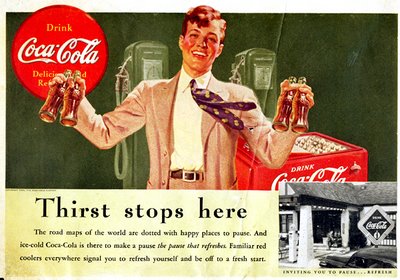Alex Constantine - April 14, 2010
Skeletons in the Corporate Closet: Coke
 There’s almost no corner of the world in which one can’t get their hands on a Coca-Cola.
There’s almost no corner of the world in which one can’t get their hands on a Coca-Cola.
The Coca-Cola Company (KO) relies on a global network of independent bottlers, who buy syrup from Coke’s Atlanta headquarters, add carbonated water, then package and distribute the finished product -- not entirely unlike the way McDonald’s (MCD) sells burgers to franchisees who warm and package them for sale to the public.
While Coke represents a wholesome, all-American image to consumers, there are markets necessary to its long-term financial health that don’t adhere to wholesome, all-American ideals.
Take Colombia, where a decades-long civil war has resulted in thousands of assassinations, kidnappings, and cases of torture at the hands of right-wing paramilitary groups -- including the killings of eight people who worked for Coca-Cola bottlers.
According to a lawsuit filed in Miami in 2001 by the United Steelworkers of America, on behalf of Colombian food-and-drink union Sinaltrainal, after the union elected a new board, Ariosto Milan Mosquera, the general manager of the Bebidas y Alimentos bottling plant in Carepa, Colombia (owned by Richard Kirby and his son Kielland, of Miami, FL), brought in paramilitary members to destroy the union.
On the morning of December 5, 1996, Isidro Segundo Gil, a union negotiator who manned the plant’s front gate was shot and killed by paramilitary members on motorcycles.
Luis Adolfo Cardona, another employee who was working at the plant at the time, was tracked down by Minyanville in Chicago, IL, where he now lives after being relocated by the US government through a program for individuals whose lives are in danger.
“When we were negotiating a new contract, we began to receive threats from Mosquera,” he explained. “It was widely known that he was friendly with paramilitary members; he would go out and socialize with them.”
Reports assert that the plant workers repeatedly asked management to intervene for their safety, to no avail.
Shortly after Gil was assassinated, Cardona says paramilitary members forced the union members to resign, under the threat of further violence.
“All of the members received the very same resignation letter, the only thing different were the signatures,” he recounted.
The extent of the brutality against Colombian union workers seems almost too unbelievable to be true. A bit of historical perspective may help to put it in context:
The far-right United Self-Defense Forces of Colombia, or AUC, was formed in reaction to the leftist Revolutionary Armed Forces of Colombia, or FARC, the military wing of the Colombian Communist Party; both groups are listed as terrorist organizations by the US State Department, alongside Al Qaeda and Hamas. In the 1990s, the AUC became allied with Colombia's military, political and business establishments, and began serving as a proxy for the interests of the ruling class.
Dan Kovalik, Senior Counsel for the United Steelworkers of America and one of the attorneys who filed the Sinaltrainal suit in Miami, tells Minyanville that the Colombian paramilitaries see unions as a threat to capital generation and the country holds the dubious distinction of setting the world record for the total number of union members killed -- 45 in 2009 alone.
“Imagine the White House with a radical free market political agenda with no room in it for trade unions,” he tells Minyanville. “Then, picture the Michigan Militia being pressed into service by the government, with assistance from the US military, to eliminate organized labor. It sounds absurd, but that’s what we’re dealing with in Colombia.”
Robin Kirk, who monitors abuses in Colombia for Human Rights Watch, says, "There are powerful economic interests that support the paramilitaries, and they attack union leaders again and again."
Carlos Castano, who once headed the AUC and whose skeleton was recovered from a shallow grave in 2006, said in a 2001 magazine interview, “Trade unionists prevent people from working. It is for that reason that we kill them.”
In the 1980s, the Coca-Cola Company dealt with a similar situation in Guatemala. Terry Collingsworth, a lawyer with the Washington-based International Labor Rights Fund points out that Coke removed bottling plant owner John Trotter, who had been accused of collaborating with death squads to rid the operation of union leaders. After Trotter was ousted and Coke installed new management, the violence ended.






